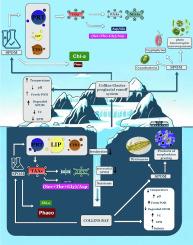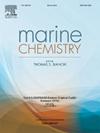Tracking suspended particulate organic matter biochemistry from glacial meltwater runoff to coastal waters of an Antarctic fjord
IF 2.5
3区 地球科学
Q2 CHEMISTRY, MULTIDISCIPLINARY
引用次数: 0
Abstract
Increased glacier melting runoff in Antarctica involves intensification of freshwater, nutrients, sediments and organic matter inputs from land to the sea, which is impacting coastal ecosystems. Basic environmental characteristics of water and biochemical composition of suspended particulate organic matter (POM) both in the proglacial melting runoff system (PROGLARS) of Collins Glacier and marine surface waters of Collins Bay was studied based on organic biopolymers and molecular level analysis of amino acids (AAs), to discern among sources and degradation state in the two environments. Hierarchical Clustering Analysis revealed that PROGLARS stations and marine stations form two distinct groups in terms of water physicochemical characteristics and suspended POM biochemical composition. These differences are the consequence of low restricted contribution of freshwater from Collins Glacier runoff into the coastal-marine environment. Our results evidenced low concentrations of terrestrial suspended POM in marine waters of Collins Bay mainly attributed to low meltwater inputs between the 1st and 7th of February 2018. In terms of macromolecular composition, the predominance of proteins, denote the labile nature of suspended POM in the two environments. Suspended POM in Collins Bay is labile, poorly degraded, representing a protein supplemented food resource, with high energetic value and easily assimilated by heterotrophic marine organism. AAs composition supported less degraded suspended POM derived from marine phytoplankton in surface waters of Collins Bay, whereas, great degradation of suspended POM in the proglacial runoff system of Collins Glacier. Changes in the biochemistry of suspended POM caused by glacial melting and retreat, may affect food features and availability, the productivity of ecosystems, and ultimately, the capacity of Antarctic fjords to act as carbon sinks and climate regulators. Considering low influence of Collins Glacier meltwater in coastal marine waters of Collins Bay, due to the relatively slow retreat of Collins Glacier and low development of its meltwater runoff system, the results of our work are relevant as baseline information for comparison with other Antarctic fjords. Further knowledge about meltwater runoff and suspended POM input dynamics in Antarctic coastal ecosystems, is critical, particularly in areas prone to undergo increased glacier melting in the following decades.

跟踪从冰川融水径流到南极峡湾沿岸水域的悬浮颗粒有机物生物化学过程
南极洲冰川融化径流的增加加剧了淡水、营养物、沉积物和有机物从陆地向海洋的输入,对沿岸生态系统产生了影响。根据有机生物聚合物和氨基酸(AAs)的分子水平分析,研究了科林斯冰川的冰川融化径流系统(PROGRARS)和科林斯湾海洋表层水的水的基本环境特征和悬浮颗粒有机物(POM)的生物化学组成,以区分两种环境的来源和降解状态。分层聚类分析(Hierarchical Clustering Analysis)显示,PROGRLARS 站和海洋站在水理化特征和悬浮 POM 生物化学组成方面形成了两个不同的群体。这些差异是柯林斯冰川径流淡水进入沿岸-海洋环境受限程度低的结果。我们的研究结果表明,柯林斯湾海水中陆地悬浮 POM 浓度较低,主要归因于 2018 年 2 月 1 日至 7 日期间融水输入量较低。在大分子组成方面,蛋白质占主导地位,这表明两种环境中的悬浮 POM 都具有易变性。柯林斯湾的悬浮POM易变、降解性差,是补充蛋白质的食物资源,具有高能量价值,易被海洋异养生物同化。在柯林斯湾表层水域,来自海洋浮游植物的 AAs 成分支持降解程度较低的悬浮 POM,而在柯林斯冰川的冰川径流系统中,悬浮 POM 降解程度很高。冰川融化和后退引起的悬浮 POM 生物化学变化可能会影响食物特征和供应、生态系统的生产力,并最终影响南极峡湾作为碳汇和气候调节器的能力。考虑到柯林斯冰川融水对柯林斯湾沿岸海域的影响较小,因为柯林斯冰川退缩相对较慢,其融水径流系统开发程度较低,我们的研究结果可作为与其他南极峡湾进行比较的基线信息。进一步了解南极沿岸生态系统的融水径流和悬浮 POM 输入动态至关重要,尤其是在未来几十年冰川融化加剧的地区。
本文章由计算机程序翻译,如有差异,请以英文原文为准。
求助全文
约1分钟内获得全文
求助全文
来源期刊

Marine Chemistry
化学-海洋学
CiteScore
6.00
自引率
3.30%
发文量
70
审稿时长
4.5 months
期刊介绍:
Marine Chemistry is an international medium for the publication of original studies and occasional reviews in the field of chemistry in the marine environment, with emphasis on the dynamic approach. The journal endeavours to cover all aspects, from chemical processes to theoretical and experimental work, and, by providing a central channel of communication, to speed the flow of information in this relatively new and rapidly expanding discipline.
 求助内容:
求助内容: 应助结果提醒方式:
应助结果提醒方式:


